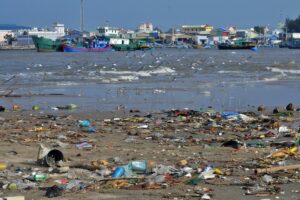Pollution control in Nigeria has to be a priority. Several Nigerian cities are a huge pollution menace. While industrial pollution remains a huge aspect of pollution concern, human and animal waste are other contributing factors.

In several parts of Nigeria, open defecation is highly practiced the use of open drainage in the country has not been helpful to the situation as residents have the habit of dumping just about any dirt into such open drainage.
Pollution of all kinds can be a huge health and environmental concern. There’s a need to implement pollution control in Nigeria. Implementing such control will start with examining the most common causes of pollution in the country. Such examination could lead to a realistic model of implementing such control.
When looking at pollution control in Nigeria, it could be often easy to pin the entire responsibility on the government. Far from that, everyone contributes to Nigeria’s pollution. It is critical then that not just governments but organizations, businesses, and individuals should be held accountable for pollution in the country.
Common Pollution of Highest Concern in Nigeria
To identify causes and implement pollution control in Nigeria, it is important to look at the most common pollution that needs serious attention. Some of these common polluting factors and practices include:
- Using Open Drainage as a Refuse Dump: One of the most irritating pollution scenarios in Nigeria is using open drainage as a refuse dump. Although residents do this in the hope that when it rains, such refuse would be carried away by the water, it is unknown if the resident realizes that even if it rains and these refuse are floated away, the refuse doesn’t just disappear, the water would only deposit such waste somewhere else.
In several cases, the water doesn’t flow such refuse in open drainage away, sometimes the drainage gets blocked thereby causing water-logging. This is especially the case in the dry season. When the drainage is blocked, it causes further smell and mosquito infestation thereby complicating the situation and bringing multiple types of pollution. Apart from refuse, people dispose of all manners of things in such open drainage, sometimes it can be irritating.
From here it can be seen that proper disposal of our refuse is important to our environment.
- Open defecation: In Nigeria, one of the disturbing pollution menace is open defecation. Although the government has been trying to tackle this situation, it persists in several Nigerian cities. On several occasions, such practice can be seen near water bodies or open drainage. This further contaminates surface water and pollutes the air around.
We can see from here that individuals need to get involved in pollution control in Nigeria. This is because several forms of pollution are attributed to individual actions.
- Industrial Pollution: Industrial waste is by far the biggest pollution concern today. This is given the nature of such industrial pollutants which may release harmful gases into the environment. Several industrial machines run on fossil fuel. This leads to the production of even potentially climate-impacting substances.
- Oil Spill: As an oil-producing country, oil spills are one of the biggest environmental concerns of Nigeria’s oil-producing communities. Several times, different Nigerian administrations have made efforts to cleanse these communities where their lands have been polluted by oil spills. These efforts are yet to bear considerate fruits.
The lands are damaged. The Niger Delta is the Nigerian region with the highest crude oil deposit. Over the years, oil drilling has exposed these communities to severe impacts. Apart from the crude deposit, the Niger Delta are coastal areas and practice fishing but oil spills are currently threatening aquatic lives in the area.
Among several of the current pollutants begging for pollution control in Nigeria, oil spills seem to be the ones needing the greatest attention as livelihood and quality of life in the impacted community keep deteriorating.
- Waste Management Failure: The failure of waste management pushes people into self-help. Often a particular location is chosen around a market or similar places where refuse is disposed off. In several cases, a mountain of refuse would pile up. This will become a fertile ground for rodents and other dirt-loving creatures to thrive. Harmful organisms can also thrive in such environments. Such refuse heaps also come with its associated smell.
It is important that while individuals need to be more proactive in tackling pollution, the government also needs to play its part by ensuring that government institutions responsible for pollution control in Nigeria live up to their duty.
- Other tough-to-decompose pollutants: Pollutants can be of varying concern. While some pollutants can have a terrible yet short impact, others may not have a terrible smell but they can stay on for years. These include plastics, metallic objects, and others. It can take quite a long time for such pollutants to be broken down. It is important to find and recycle some of these pollutants when possible.
Conclusion
Pollution control in Nigeria would be beneficial for all when relevant authorities and individuals take action to actualize an environment where pollution is significantly reduced. While the government needs to lead the way, we have seen that individuals and industries contribute a great chunk of the pollution.
We must be proactive as individuals, corporations, and organizations to tackle pollution. If the government must succeed in implementing pollution control, individuals, firms, and organizations need to get involved.
 Home
Blog
Home
Blog